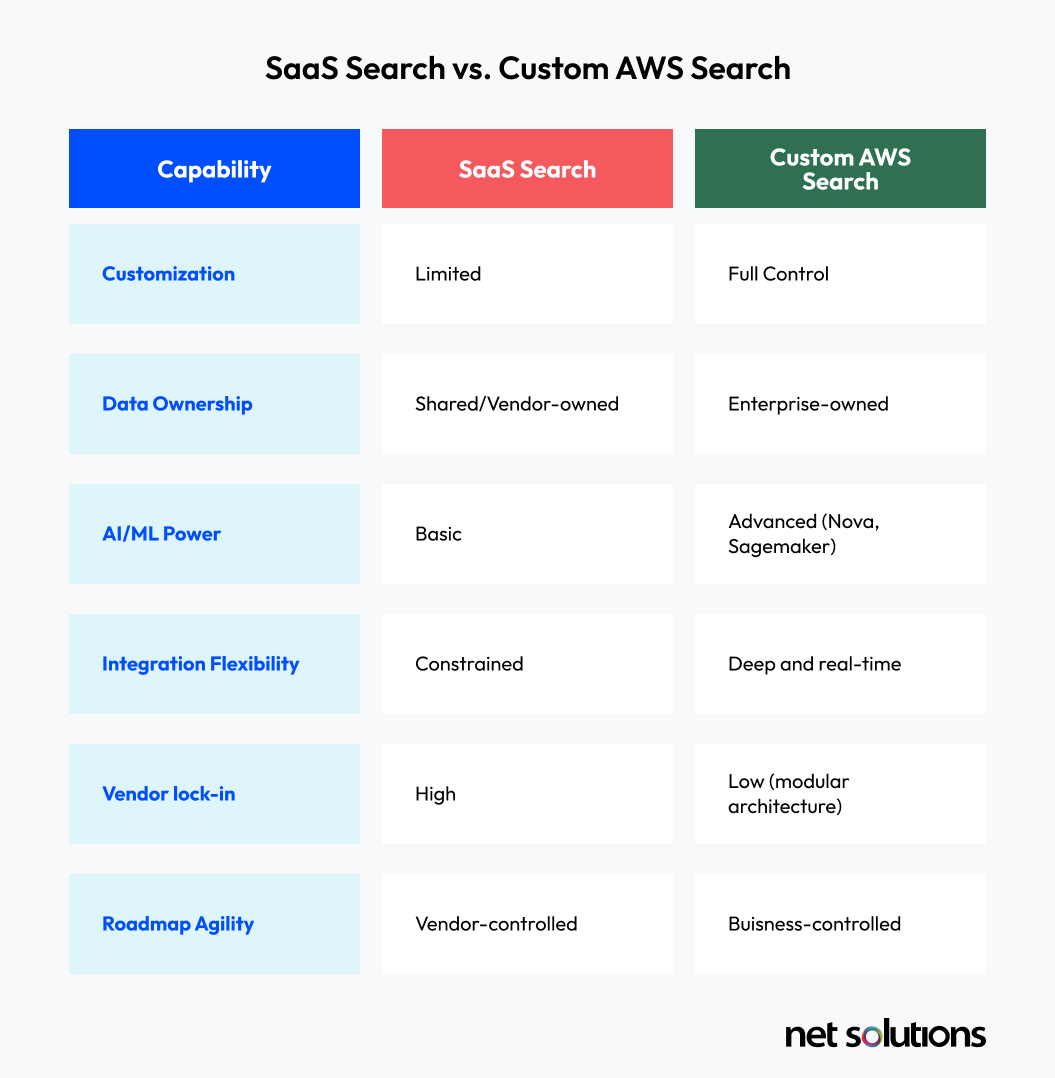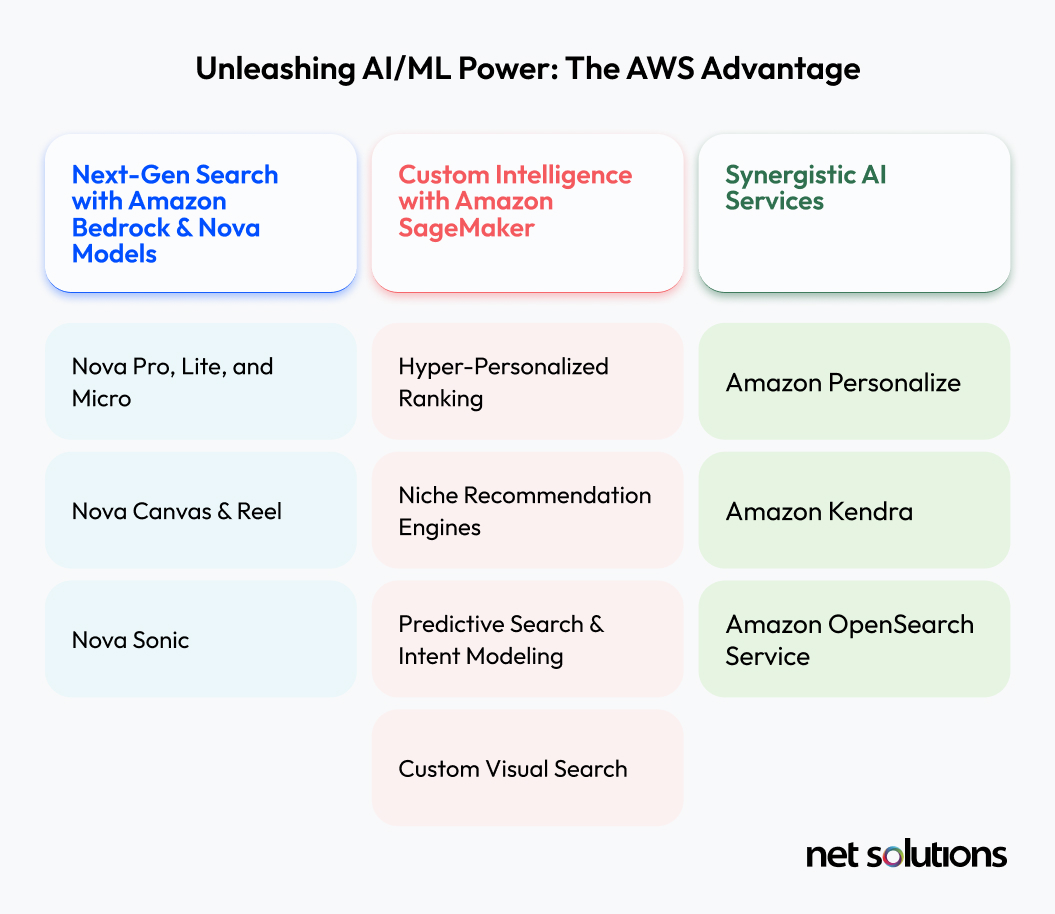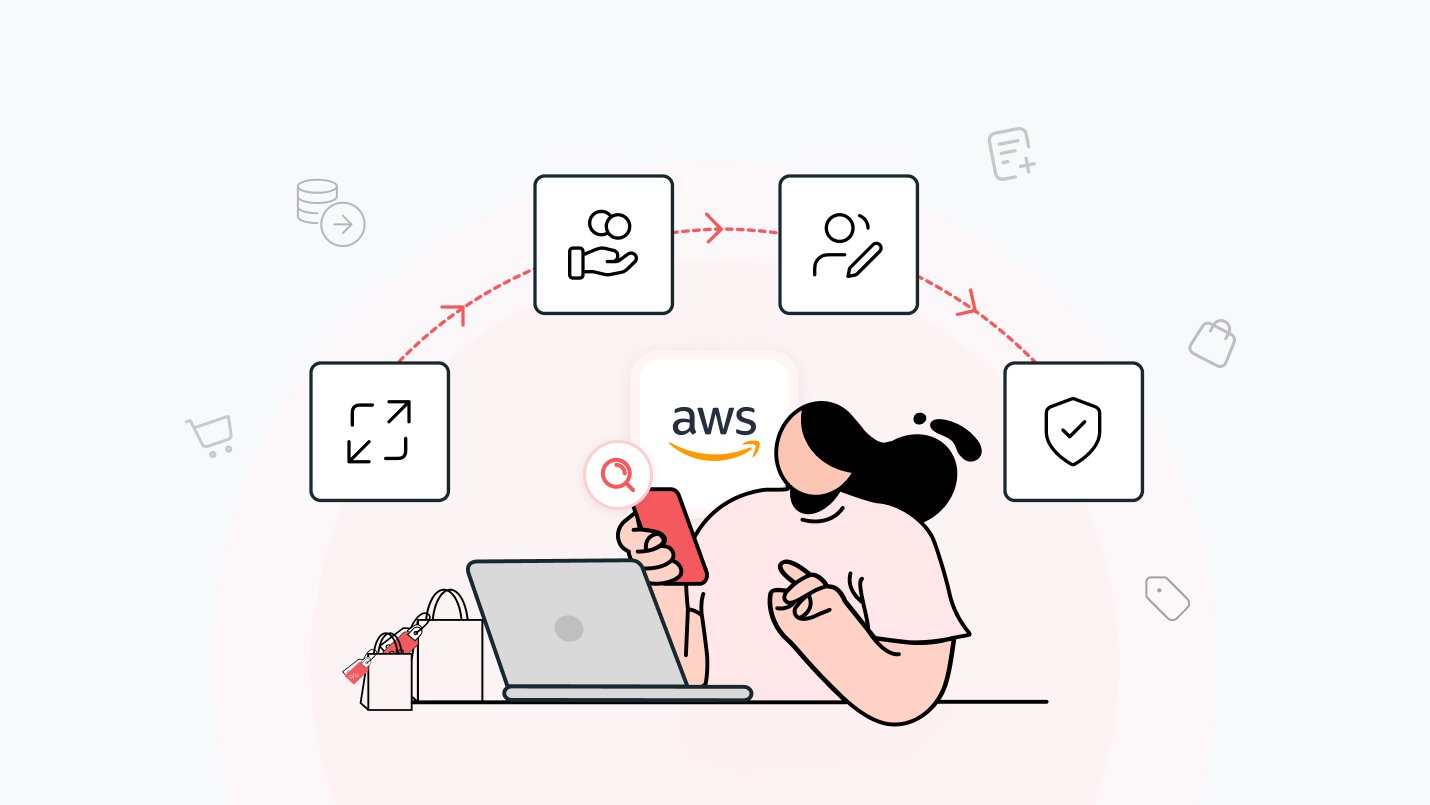In the hyper-competitive landscape of enterprise eCommerce, the search bar isn’t just a utility; it’s the digital front door, the primary engine of discovery, and a critical determinant of customer experience and conversion. Get it wrong, and potential revenue walks away frustrated. Get it right, and you unlock significant growth.
For IT and tech business leaders, this presents a crucial strategic decision: Do you opt for a seemingly convenient off-the-shelf Software-as-a-Service (SaaS) solution, or do you invest in building a custom search and product discovery powerhouse tailored precisely to your business needs, leveraging the advanced capabilities of platforms like Amazon Web Services (AWS)?
While SaaS solutions promise speed and simplicity, this blog argues that for enterprises aiming for market leadership and sustainable differentiation, the constraints of generic platforms outweigh their initial appeal. The strategic imperative lies in building a custom solution on AWS – leveraging services like Amazon Bedrock (including the powerful Nova foundation models), Amazon SageMaker, Amazon Personalize, Amazon Kendra, and Amazon OpenSearch Service. This approach offers unparalleled control, fosters true innovation, and delivers superior long-term value and a formidable competitive advantage.
Exploring Intelligent Product Discovery with GenAI
eCommerce search isn’t just about keywords anymore. Today’s customers expect smart, personalized, intuitive search experiences that help them discover what they need, or didn’t even know they needed.
This is where custom AWS search, enhanced with GenAI, comes into play. It doesn’t just fetch results; it understands user intent, adapts to behavior, and drives higher conversions through intelligent product discovery.
GenAI can help deliver a truly intelligent search experience, from NLP-powered query parsing to context-aware recommendations, elevating CX and business impact. Let’s now explore how a custom AWS-powered search engine works under the hood, and what it takes to implement one that’s both scalable and intelligent.
The Illusion of Simplicity: Unpacking the Constraints of SaaS Search
Off-the-shelf SaaS search platforms appear attractive, promising rapid deployment and predictable subscription fees. However, for large enterprises with unique operational complexities, specific branding mandates, and the ambition to deliver truly differentiated customer experiences, the inherent limitations of SaaS quickly become apparent.
1. The Customization Ceiling
SaaS platforms are built for the masses, offering standardized features and limited customization options, often confined to templates or restricted APIs. This “one-size-fits-many” approach forces enterprises to compromise on tailoring the user experience (UX) to their unique brand identity and customer journeys. More critically, it hinders the implementation of proprietary business logic – the unique rules governing product availability, customer-specific pricing tiers, or complex bundling strategies – that often form the core of an enterprise’s competitive edge. You’re forced to fit your unique business processes into the vendor’s predefined box.
2. Data Control Dilemmas
Adopting SaaS means entrusting your most valuable asset – customer and interaction data – to a third party. This relinquishes direct control over data storage, access, portability, and how it can be leveraged. While vendors manage infrastructure security, the enterprise remains responsible for data governance within the application. This lack of control is a significant roadblock for businesses with stringent internal policies, specific industry regulations (beyond standard GDPR/CCPA often covered by vendors), or ambitions to use their unique data for custom AI/ML models. Accessing granular data for bespoke analytics or training sophisticated models on platforms like Amazon SageMaker becomes difficult, if not impossible.
3. The Vendor Lock-In Trap
Migrating a complex enterprise eCommerce operation away from an entrenched SaaS provider is difficult and expensive. This high switching cost creates significant vendor lock-in. Your strategic roadmap becomes tethered to the vendor’s priorities, release cycles, and pricing whims. Need a critical feature to respond to a market shift? You’ll have to wait and hope it aligns with the vendor’s timeline, potentially missing crucial opportunities. This dependency stifles the agility essential for thriving in the fast-paced eCommerce world. Risks include technological stagnation if the vendor lags, unexpected cost hikes, and service discontinuation.

The Custom Imperative: Building Strategic Advantage on AWS
In stark contrast, a custom search and discovery solution built on AWS empowers enterprises to transform this critical function from a cost center into a strategic differentiator.
1. Crafting Unique Experiences & Embedding Proprietary Logic
Custom development allows you to design a search experience perfectly aligned with your brand, target audience, and unique value proposition. You dictate the UI/UX, moving beyond generic templates. Crucially, you can embed complex, proprietary business rules directly into the platform’s core. Need unique filtering based on proprietary data? A custom product configurator? Special pricing logic for VIP tiers triggered by CRM data? A custom build makes it possible, creating a superior, differentiated experience that fosters loyalty and drives conversions. In a market where competitors often use the same SaaS tools, this unique experience becomes a powerful competitive moat.
2. Seamless Integration Across the Enterprise
Custom solutions are designed for deep, real-time integration with your existing technology stack – ERP, CRM, PIM, OMS, marketing automation, and data warehouses. Unlike the often-limited or batch-oriented APIs of SaaS platforms, custom integrations ensure seamless data flow, streamlining operations and providing a unified view of the customer. This isn’t just about efficiency; it’s about intelligence. Accessing real-time data from across the enterprise (e.g., inventory levels from ERP, loyalty status from CRM) fuels smarter personalization, dynamic pricing within search, and more accurate results, capabilities often constrained by SaaS integration limits.
3. Uncompromising Data Ownership and Governance
Building on your own AWS account means unambiguous ownership and control over your application data. You dictate security policies, access controls, encryption (using services like AWS Key Management Service – KMS), data residency, and audit logging to precisely match your internal governance, risk profile, and regulatory needs. This allows for a more tailored and potentially stringent security posture than standardized SaaS offerings. You control backups, retention, and compliance verification (like GDPR/CCPA), treating your data as the strategic asset it is.
Unleashing AI/ML Power: The AWS Advantage

The most compelling reason for a custom AWS approach is the ability to harness the full power of cutting-edge AI and Machine Learning, going far beyond the often generic, black-box algorithms in SaaS tools.
1. Next-Gen Search with Amazon Bedrock & Nova Models
AWS Bedrock provides access to powerful foundation models (FMs), including the state-of-the-art Amazon Nova family. These models enable sophisticated natural language understanding, semantic search (understanding intent, not just keywords), generative personalization, and conversational interfaces.
- Nova Pro, Lite, and Micro: Offer varying levels of intelligence, speed, and cost. They excel at text and vision understanding, reasoning, and agentic tasks. Nova Pro and Lite handle multimodal inputs (text, image, video) with large context windows (up to 300k tokens), enabling advanced visual search or analysis of product imagery.
- Nova Canvas & Reel: Generate high-quality custom images and videos for personalized marketing or dynamic product visualization.
- Nova Sonic: Enables human-like, real-time voice conversations for conversational commerce, supporting bidirectional streaming.
Integrating these models allows you to build search experiences that understand context, engage in dialogue, and generate personalized results and content dynamically—a significant leap beyond traditional keyword matching. Imagine a search that understands “show me durable, waterproof hiking boots for wide feet under $200 available for pickup near me” and returns precisely that, perhaps even generating a personalized summary comparing the top 3 options.
2. Custom Intelligence with Amazon SageMaker
SageMaker is AWS’s end-to-end ML platform, empowering you to build, train, and deploy custom ML models using your unique data. This is where true differentiation happens. Instead of relying on generic SaaS algorithms, you can create proprietary models for:
- Hyper-Personalized Ranking: Optimize search results based on your specific business goals (margin, inventory, CLV) combined with user behavior.
- Niche Recommendation Engines: Uncover non-obvious product relationships specific to your catalog.
- Predictive Search & Intent Modeling: Anticipate user needs before they even finish typing.
- Custom Visual Search: Train models on your product images for superior accuracy.
SageMaker provides the tools (like SageMaker Canvas for low-code, JumpStart for pre-trained models, and robust infrastructure including GPU instances) to turn your proprietary data into a competitive weapon.
3. Synergistic AI Services
A custom AWS solution allows you to orchestrate a suite of specialized AI services:
- Amazon Personalize: Offers managed, battle-tested ML recipes for common eCommerce recommendations (“Frequently Bought Together”, “Recommended for You”). It handles real-time personalization and can be augmented by Bedrock.
- Amazon Kendra: Provides intelligent enterprise search over structured and unstructured data (product descriptions, reviews, FAQs) using natural language processing. It integrates with LLMs for Retrieval-Augmented Generation (RAG), grounding answers in your content.
- Amazon OpenSearch Service: Delivers high-performance text and vector search capabilities, which are crucial for semantic search, similarity search, and multimodal search across billions of items in milliseconds. The Vector Engine for OpenSearch Serverless is optimized explicitly for generative AI applications.
This composable approach lets you use the best tool for each job – perhaps OpenSearch for initial retrieval, SageMaker for re-ranking, Personalize for recommendation carousels, and Bedrock for the conversational layer – creating a system far more powerful than a monolithic SaaS offering.
Rethinking the Financials: TCO, ROI, and Agility
The sticker price of SaaS can be misleading. An actual Total Cost of Ownership (TCO) analysis often favors a custom AWS solution for strategic enterprise functions.
1. SaaS TCO Includes
Recurring subscription fees, costly integration workarounds, data egress charges, potential vendor price hikes, massive switching costs, and the opportunity cost of missed innovation due to platform limitations.
2. Custom AWS TCO includes
Initial development (potentially $50k-$150k+ for an MVP ), pay-as-you-go AWS infrastructure costs (which can be optimized ), and ongoing maintenance/evolution. However, you avoid vendor license fees, and cloud-native/serverless architectures can be highly cost-efficient.
- Higher Conversion Rates: Personalized search and recommendations significantly lift conversions. Studies show stores see increases after adopting personalization.
- Increased Average Order Value (AOV): Tailored cross-selling/upselling logic boosts basket size.
- Improved Customer Lifetime Value (CLV): Superior experiences foster loyalty. The control offered by a custom AWS solution allows continuous optimization focused directly on these KPIs, maximizing ROI in a way SaaS cannot.
Finally,agility. Owning the development roadmap means you iterate at your speed, not the vendor’s. AWS services and agile methods enable rapid prototyping, testing, and deployment. Need to react to a competitor or leverage a new AI model? You can do it immediately, not wait months for a vendor update. This speed is a critical competitive advantage.
Forging the Competitive Edge: Examples from the Field
The ultimate goal is sustainable competitive advantage, and a custom AWS search solution provides the tools to build it. By breaking free from the homogeneity of common SaaS platforms, you can create a uniquely effective, intuitive, and personalized discovery journey that competitors struggle to replicate.
Think about leading brands and how differentiated discovery experiences likely contribute to their success:
- Amazon: The pioneer of personalization, constantly refining its recommendations (“Recommended for You,” “Frequently Bought Together”), likely using sophisticated, custom-built systems that leverage vast data and ML. AWS services like Personalize offer similar capabilities.
- Chewy: Their custom platform delivers highly personalized experiences, auto-ship options, and tailored recommendations that resonate deeply with pet owners, driving loyalty and repeat sales.
- Zappos: Known for customer service and a vast catalog, their custom platform likely enabled advanced SEO and mobile optimization, driving significant organic growth through superior discovery.
- Mercado Libre: Latin America’s largest eCommerce ecosystem, handling 40 purchases per second, relies on AWS cloud services for the scale and agility needed to manage its complex operations and likely its discovery mechanisms.
These examples illustrate how investing in tailored, potentially custom-built technology for core functions like search and discovery enables market leaders to create superior experiences, enhance brand perception, and build lasting customer relationships. A custom AWS solution also offers better future-proofing; you control technology adoption, allowing you to integrate the latest AWS innovations (like new Nova models or SageMaker features) as soon as they’re relevant, staying ahead of competitors locked into slower vendor cycles.
The Strategic Choice: Invest in Differentiation
For enterprise eCommerce leaders, differentiated customer experiences are the path to sustained growth and market leadership. While off-the-shelf SaaS solutions offer a tempting shortcut, they ultimately impose constraints that limit customization, stifle innovation, compromise data control, and hinder agility.
Investing in a custom search and product discovery solution built on AWS is a strategic imperative. It grants you the control to craft unique user journeys, embed proprietary intelligence, leverage your data as a true asset with advanced AI/ML, and adapt swiftly to the market. While the upfront investment is higher, the long-term TCO can be more favorable, the ROI potential is significantly greater, and the resulting competitive advantage is far more sustainable.
Don’t settle for a generic experience. Empower your enterprise with the control, flexibility, and intelligence of a custom AWS solution, and turn your search and discovery function into a powerful engine for growth and market leadership.



